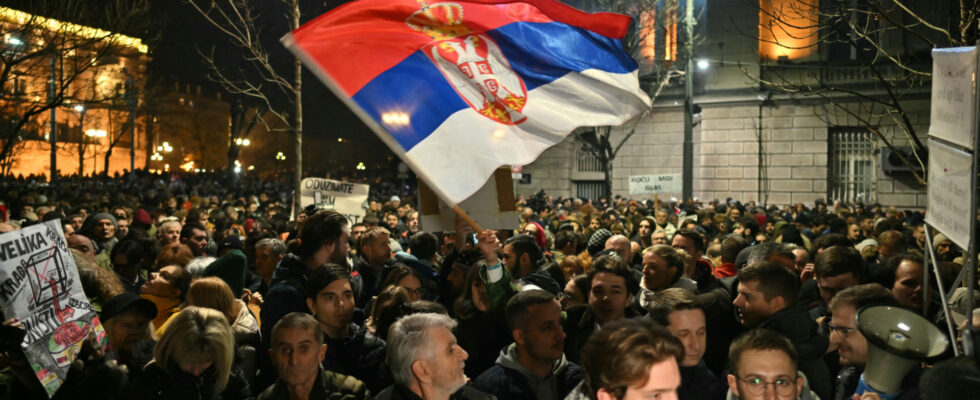Thousands of people demonstrate Monday evening in Belgrade, Serbia, to denounce the results of the elections, marked by “vote buying” and “ballot box stuffing”, according to international observers, the day after a victory declared by the presidential camp which even claimed an absolute majority in Parliament. According to the first results – the official count had not yet fallen at the start of the evening – the SNS (nationalist right) won 127 seats out of the 250 in Parliament. And would also be in the majority in Belgrade, with more than 38% of the votes.
But the opposition denounces fraud in the capital: several thousand demonstrators gathered Monday evening in front of the electoral commission to demand a cancellation of the vote and the departure of the president, Aleksandar Vučić. “Vučić, thief, you stole the elections”, “Vučić go away”, the crowd chanted. Sunday’s legislative elections were coupled in some places with local ballots. This was particularly the case in Belgrade, where 1.5 million people live, almost a quarter of the country. The SNS claimed the majority there – with 38.5% of the votes, or 23,000 more than the opposition.
“Procedural irregularities”
But according to the opposition coalition “Serbia Against Violence” (SPN), “more than 40,000 people” voted in the capital without being residents, transported by bus from Republika Srpska, the Serbian entity in neighboring Bosnia. Several videos posted on social networks on Sunday claimed to show the arrival of voters in one of the city’s stadiums, where they were told in which neighborhoods they should go to vote.
Allegations of fraud confirmed by the preliminary report of the international observation mission (OSCE, European Parliament and Council of Europe): the observers described a vote “marked by isolated cases of violence, procedural irregularities and frequent allegations of organizing and transporting voters to support the ruling party in local elections”, as well as “vote buying and ballot stuffing”. “The opinion of the OSCE is the same as that of the crowd gathered here,” Dragan Djilas, one of the leaders of the opposition coalition “Serbia Against Violence,” told the demonstrators.
Two coalition leaders to begin hunger strike
“We demand that the elections be canceled, that the electoral registers be cleaned (of false voters, editor’s note), and we hope that we will achieve this by peaceful means.” Two other coalition leaders, Marinika Tepić and Miroslav Aleksić, will start a hunger strike, he added. Born in the wake of the massive demonstrations which shook the country in May, after the death of 19 people in two shootings – including one in a primary school – the coalition has constantly denounced a biased campaign.
The campaign was marred by “violent rhetoric, biased media, pressure on public sector employees and misuse of public resources”, all against a backdrop of “decisive involvement of the president”, Aleksandar Vučić, offering his party “an unfair advantage”, according to observers. “My job was to do everything in my power so that you obtain an absolute majority in parliament,” declared Aleksandar Vučić on Sunday evening, announcing his party’s victory.
A president omnipresent in the media
The frequency of elections – three in less than four years – was also pointed out by observers, according to whom this has “further eroded public confidence in the functioning of democratic institutions”. The president’s omnipresence in the media has “had an impact on the possibility for voters to make an informed choice”, according to the observation mission. The electoral campaign mainly revolved around the economy, in one of the poorest countries on the European continent, which saw inflation reach 16% in the spring before decreasing to around 8% in November.
Aleksandar Vučić promised a minimum wage of 1,400 euros by 2027 – compared to 590 euros in November -, an increase in retirement pensions and the continuation of foreign investments in Serbia. Between 2012 and 2022, foreign direct investments in Serbia increased from 1 to 4.4 billion euros. Its success in skillfully maintaining links between east and west are also appreciated. The Serbian president is a master in the art of navigating between his “big Russian brother” and the European Union, to which Serbia has been a candidate for entry for many years. The Kremlin also “congratulated” the victory of Aleksandar Vučić’s camp.
